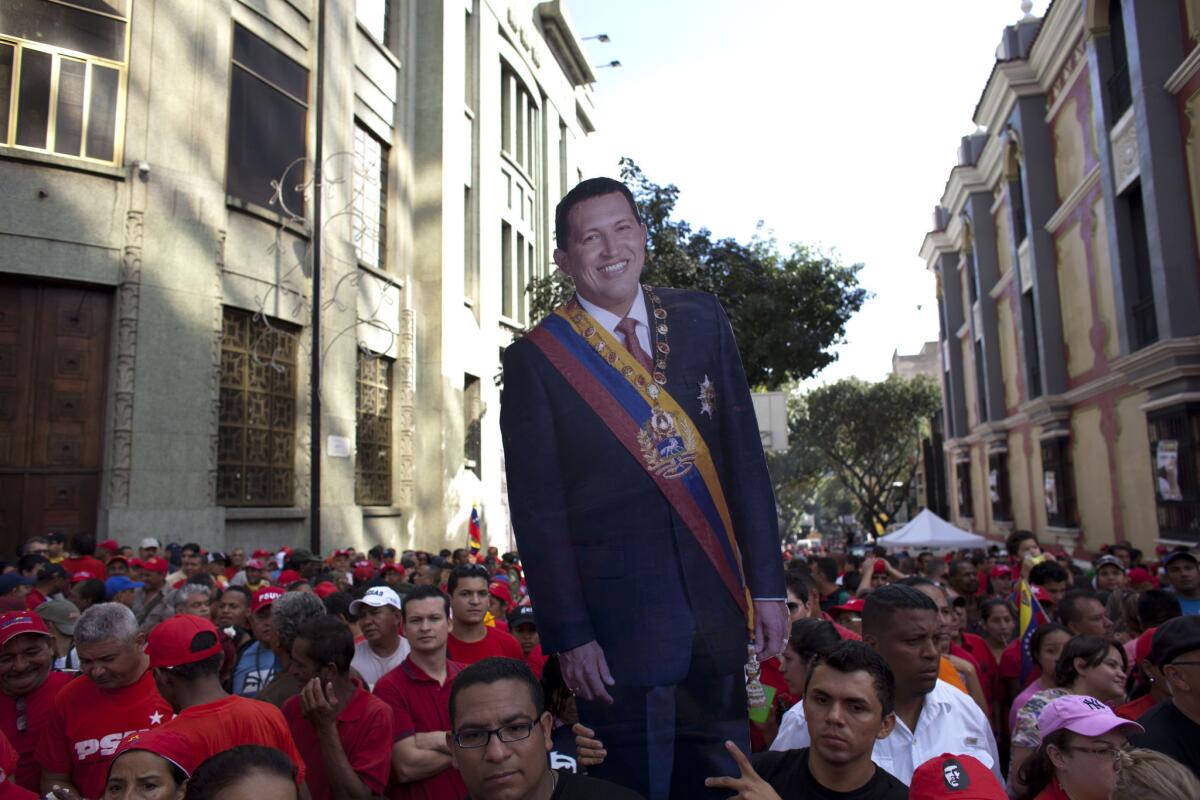Expect a stealth leadership struggle in post-Chavez Venezuela

Chavismo is alive and well in Venezuela, which is more than can be said with confidence about the man who inspired it.
President Hugo Chavez remains so ill and incommunicado a month after undergoing cancer surgery in Cuba that he missed his inauguration Thursday, setting off new political disputes over whether he is still the legitimate head of state.
Supporters of the once-larger-than-life former paratrooper nevertheless poured into the streets of Caracas to dance and declare their loyalty -- a demonstration, Latin America analysts say, of the enduring legacy of a president whose social welfare programs halved the poverty level and dramatically narrowed the gap between rich and poor.
Though often viewed abroad as a one-man show, with his barnstorming campaign style and populist savvy, Chavez nurtured a new generation of political leaders within his United Socialist Party of Venezuela who observers expect will keep the momentum going for programs to improve healthcare, education and housing.
Still, the party won’t go on forever without its charismatic host.
“Given the fact that they had an election recently, he has a tremendous amount of political goodwill. He’s still the most popular figure in the country, and the people will accept the current situation for a short time,” said Miguel Tinker Salas, a Pomona College professor of Latin American history and author of “The Enduring Legacy: Oil, Culture and Society in Venezuela.”
No one can replicate Chavez’s personality, but capable lieutenants have been groomed, and they should be able to carry on with his vision of a socialist success story after decades of gross inequality in the oil-rich nation, Tinker Salas said.
Before Chavez left for Cuba to undergo his fourth surgery for an undisclosed form of cancer, he bid an emotional farewell to the people he ruled for 14 years and urged them to support Vice President Nicolas Maduro in the event he didn’t return. That has bolstered the former bus driver and labor activist’s public standing but also set up a potential rivalry within the party ranks. Under the constitution, it would be National Assembly President Diosdado Cabello who would serve as acting president and organize new elections if Chavez can’t fulfill his term. And Cabello, a former military man like Chavez, has expressed his own interest in taking up residence in the presidential palace.
Even with the Chavez anointment, Maduro could find himself vulnerable to internal party politics, Tinker Salas warned.
Municipal elections are expected in May, and without the guidance and intervention of Chavez to settle disputes about who should run, the Chavistas face the risk of a campaign lacking unity and cohesion, said Dan Hellinger, a professor of international relations and Latin America expert at Webster University in St. Louis.
“The longer this drags on, the more difficult it is for the sympathy for Chavez and the momentum from the last election to help the PSUV,” Hellinger said of the ruling socialists, buoyed by Chavez’s decisive victory in October giving him a new six-year term and regional elections that captured 20 of 23 governorships.
The status quo of uncertainty over who holds the reins in Caracas can prevail for a few months before opposition calls for evaluation of Chavez’s competency gain any traction, Hellinger said. How long the silence and secrecy can be sustained, though, depends on how the opposition conducts itself, he added, recalling the ill-considered strikes, coup attempts and attacks on Chavez’s popular social programs that have backfired and cast business leaders and intellectuals as enemies of the struggling classes.
Both Tinker Salas and Hellinger see an enduring stamp left by Chavez, even if his political allies mishandle the succession. The ailing president’s main challenger during the October presidential vote, Henrique Capriles, ran on a platform promising to sustain the so-called missions launched by Chavez that have filled a yawning gap in social services and endeared him to the masses.
“There are limits to what the opposition can do, even if Capriles is able to become president. The National Assembly is controlled by Chavistas,” Hellinger said. Even Chavez’s foreign aid gestures, such as offering discounted oil to Cuba and other leftist-led allies in the region, stem from a historic solidarity that has existed for a century and is likely to survive Chavez, Hellinger said.
The future of Chavismo appears most vulnerable if the de facto interim government continues to hide the truth about Chavez’s condition and recovery prospects, or if anything goes wrong while Maduro is in charge, said Angel Rabasa, a senior political scientist with Rand Corp. and a former State Department and Pentagon official.
Rabasa predicts a sharp devaluation of the currency, the bolivar, in the near future as a result of the socialists’ profligate spending during the elections. That setback could bolster the opposition and give credence to its claims that the Chavistas have squandered public resources and politicized state institutions.
Though Maduro and Cabello have closed ranks and avoided any appearance of rivalry during the president’s absence, that is likely to erode when the jockeying for a successor gets underway, said Rabasa.
Chavez won the support of his people through force of his unique personality, Rabasa said, concluding that “the bond is personal, and probably not transferable.”
ALSO:
Bomb blasts across Pakistan kill 104 people
Google chief urges North Koreans to get connected
Russia says child adoption deal with U.S. is valid until 2014
A foreign correspondent for 25 years, Carol J. Williams traveled to and reported from more than 80 countries in Europe, Asia, the Middle East and Latin America.
More to Read
Sign up for Essential California
The most important California stories and recommendations in your inbox every morning.
You may occasionally receive promotional content from the Los Angeles Times.











